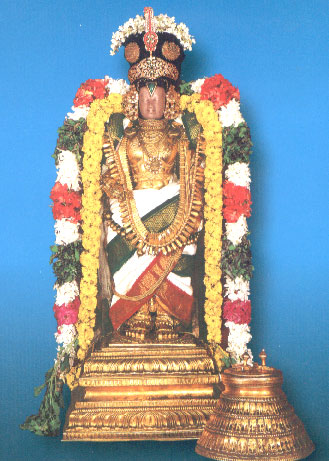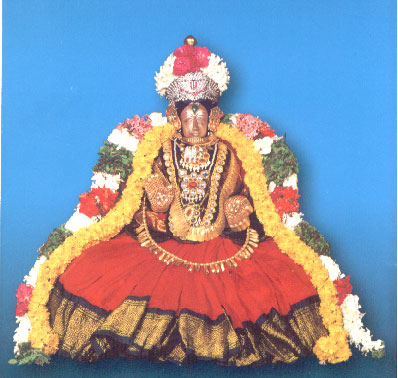Today the 44th sloka is being considered. The lecture is from the Thirukkannapuram temple. Of the various Avatars of the Lord, Sri Krishna avatara is special because of Gita. [In the 108 sacred temples/places] There are five Sri Krishna kshethras or pilgrimage places. They are Thirukkannapuram, Thirukkannamangai, Thirkkannankudi, Kapisthalam and Thirukkoyilur. We are in Thirukkannapuram temple and this place is also called Sri Krishnaranya Kshethram or the forest of Sri Krishna. We will now see the sloka:
utsanna-kula-dharmanam
manushyanam janardana
narake niyatam vaso
bhavatity anususruma
“ Oh! Janardhana! Persons who destroy kula or family tradition will dwell in Naraka as understood from the Scripts and elders” Here Arjuna addresses Sri Krishna as Janardhana or He Who removes rebirth for people. Indirectly Arjuna is implying that He is Janardhana and inducing Arjuna to destroy Kula dharma and get rebirth. Who all go to hell or Naraka and what is the connection between the destruction of family dharma and hell? People by doing good deeds get happiness by reaching Swarga or heaven and those who perform bad deeds reach Naraka or hell and suffer. The person who does bad deeds can avoid hell by two ways – by Prayaschitha or compensatory deed and by repentance. These are prescribed in the Vedas or Holy Scriptures. If one does not do either of these then he has to undergo the sufferings at the hell. Some believe the hell is another world ruled by lord Yama and some do not believe in another world called hell but in this life on this earth itself such experience will be there. But it is to be understood whether one believes in another world of hell or not, those who commit sins have to undergo the sufferings of hell. Whichever gives us pleasure it is swarga and whichever makes one to suffer is naraka.
Sri Rama is preparing to leave for the forests and He takes leave of all. He goes to His mother Kousalya and takes leave and she says she will also accompany Him. Sri Rama pacifies her and next He goes to Sri Sita and takes leave. He tells Her the He would spend the fourteen years in forests like fourteen minutes and return and till then She should look after Dasaratha, His father as not Her father-in-law but father and consider Kousalya as Her mother and serve them. Bharatha and Shatrugna ,when they return from their [grand father’s] place , should be treated as brother and son. Sri Sita refuses and reminds Sri Rama what He told His mother. He told His mother that as a true wife she should not desert her husband and go with the son to forests. So how can now He ask His own wife to desert Her husband and remain in Ayodhya? Also Her father Janaka will ill think of Sri Rama that He could not take His wife to forests and protect Her. Still Sri Rama insists on Her remaining in Ayodya and frightens of the dangers in forest life. Sita in reply tells Sri Rama that she would pose a question to Him and if His answer is convincing She would remain in Ayodya if not She would accompany Him. She asks what is heaven and which is hell. Sri Rama being the disciple of Vasishta gives a detailed explanation of the two. Heaven is the third upper world. This earth being first and Bhuva loka or world is the second and Suva loka is the third ruled by Indra, where happiness and pleasures are abound. Hell is the opposite with all sorts of hardships like boiling oil, wild animals and insects trying to harm. Those who do good deeds or punya go to heaven and those who do bad deeds or papa reach hell. She laughed at this long explanation and told Him that He should have answered Her question which is heaven and which is hell with a return query “ in whose perception?” Because the perception of hell and heaven changes from person to person. What one considers as heaven may be hell to another and vice versa. Also such experience can be felt here itself. An ordinary person may think it is heaven if he could get food daily for him and his family. A laborer may think that if his health is maintained, so that he is able to earn, is heavenly experience. A devotee may consider it heaven if he is always thinking of God and hell if this thought is broken. A lecturer like me or a musician may consider it heaven if the throat is well maintained. So according to perception the heaven and hell changes. Sri Sita continues and tells Sri Rama that for Her parting Sri Rama is hell and being with Him is heaven. If She were deserted and left in Ayodya, the same will prove to be hell for Her. On the other hand if She accompanies Him, even the frightening forests would be heaven.
So it is not necessary for anyone to search for hell or heaven as they are available here itself. If the desired things are done it is heaven if not hell. Arjuna feels that by destroying a family he is bound to suffer here itself or in another world, hell.
Here one may ask why not Arjuna do prayaschitha after the fight. Prayaschitha is prescribed for every bad act and it varies if the bad action was done by thought or words or physically. We should note prayaschitha or compensatory deed couldn’t be the remedy always. This is because just as exceptions cannot be the rule, one cannot be doing all sinful deeds and do prayaschitham as compensation. Especially when a sin or wrong deed is done with full knowledge prayaschitham loses its meaning. So Arjuna feels that by committing this sin his conscience will not permit him to do prayaschitham. Repentance also is no solution as he is committing this sin knowingly. Here one should note that if we commit a sin to God we could seek His pardon. But if we do anything wrong to His devotees, He will not pardon if we approach Him but we will have to seek the pardon of His devotees only. So one has to be very careful when dealing with His devotees. Arjuna fears that in this war he may hurt some such devotees and so he neither wants to go to hell nor want to have that hellish experience here itself.



No comments:
Post a Comment